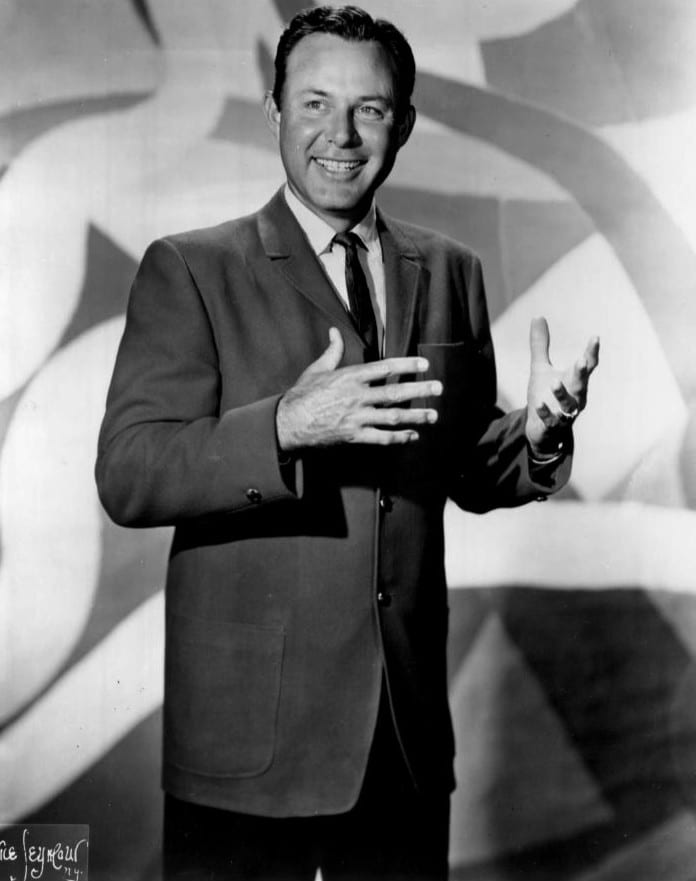A Voice That Echoes Through Time: The Story Behind Jim Reeves’ “He’ll Have to Go”
No one at the Nashville recording session could have anticipated that a hushed, sorrowful ballad would go on to redefine the boundaries of country music.
Yet, whispers within the music world hinted at something special—a song that would mark a turning point, not just for one artist, but for the genre as a whole. When Jim Reeves stepped into the studio in 1960 to record “He’ll Have to Go,” an almost mystical air settled over the room. This wasn’t just another heartbreak song. It was the beginning of something unforgettable.

Table of Contents
The Rise of a Classic
Released in 1960, “He’ll Have to Go” became more than just a hit—it was a transformative moment for American music. Blending smooth, velvety vocals with a melancholic storyline, the track captivated both country and pop audiences. Jim Reeves, affectionately dubbed “Gentleman Jim,” was already respected in the country circuit, but this haunting ballad launched him into a different league—one of timeless influence.
The song’s emotional core, wrapped in a simple phone conversation between a man and his distant lover, gave voice to unspoken fears and fragile hope. Its universal theme of love slipping away resonated with listeners across cultures and backgrounds.
A Song Born of Real Life
Penned by Joe and Audrey Allison, the inspiration for “He’ll Have to Go” came from a real-life scene Joe witnessed—a man trying to reclaim a lost connection over a phone call in a noisy bar. That poignant moment was distilled into one of the most emotionally honest songs ever written, where every lyric feels like a whisper into the soul.
Breaking Barriers, Building Bridges
Jim Reeves’ performance was more than technically perfect—it was emotionally pure. His deep, controlled baritone didn’t just sing the song; it lived in it. The track soared to No. 1 on the Billboard country chart and climbed to No. 2 on the pop chart, making it one of the first country songs to so powerfully cross over into mainstream success.
The success of “He’ll Have to Go” proved something revolutionary: country music could be elegant, universally relatable, and commercially massive without losing its heart.
A Global Ambassador for Country Music
Following the success of the song, Reeves became one of the first American country artists to find widespread success overseas. He performed around the world, introducing country’s emotive storytelling to international audiences who had never experienced anything quite like it.
His music became the gateway for global listeners to discover country—long before streaming or satellite radio erased borders.
Legacy Beyond the Charts
“He’ll Have to Go” inspired countless covers, from Elvis Presley to Ry Cooder. Yet none could match the intimacy and quiet desperation Reeves conveyed. His original remains the definitive rendition—an unmatched blend of technical control and emotional surrender.
The song didn’t just chart. It lingered. It found its way into films, commercials, and generations of playlists, always maintaining its emotional grip on listeners, old and new.
A Sudden Goodbye
In 1964, tragedy struck. At just 40 years old, Jim Reeves died in a plane crash, cutting short a career that was still in full bloom. But while his life ended abruptly, his influence did not. His voice, especially in “He’ll Have to Go,” became immortal.
Years later, he was inducted into the Country Music Hall of Fame, solidifying the place he had earned with both his artistry and vision.
A Timeless Influence
The impact of “He’ll Have to Go” is still felt today. Artists like Keith Urban, Taylor Swift, and Shania Twain—all of whom have blended country roots with pop sensibilities—owe part of their musical lineage to the path Reeves forged. He proved that country music could grow, evolve, and touch hearts around the world.
The song is now a benchmark—used to measure sincerity, vocal depth, and timeless songwriting. It’s not just a hit from the past; it’s a piece of musical DNA passed down through generations.
Conclusion: More Than Just a Song
Jim Reeves’ “He’ll Have to Go” is more than a ballad—it’s a living artifact of American music history. Its tender lyrics, haunting melody, and masterful delivery set a standard for what country music could be. Reeves didn’t just deliver a chart-topping performance—he offered a masterclass in subtlety, vulnerability, and universal emotion.
In a world where trends come and go, “He’ll Have to Go” endures. It whispers truths we still understand, aches we still feel, and love we still long for. If you’ve never heard the song that changed everything, now is the time. Let Jim Reeves’ voice remind you why some music never fades—it only deepens with time.
